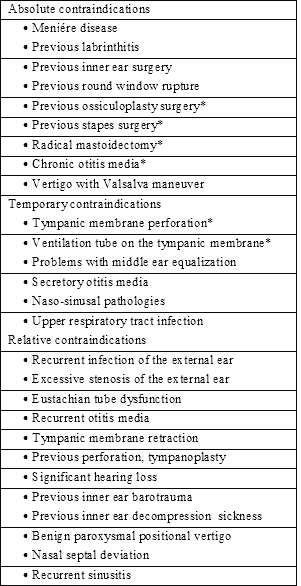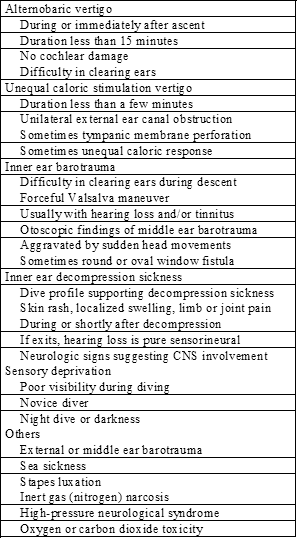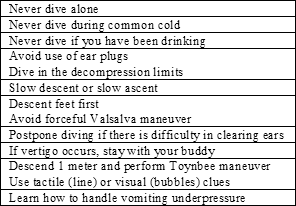

|
Journal Home Contents Preview Next |
Pro Otology
Balkan Journal of Otology & Neuro-Otology, Vol. 3, No 1:21-25 © 2003
All rights reserved. Published by Pro Otology Association
Vertigo and Scuba Diving
Cem Uzun
Department of Otorhinolaryngology, Head and Neck Surgery Trakya University, Faculty of Medicine, Edirne, Turkey
ABSTRACT
Objective: Vestibular system is the most important source of inputs during scuba (self-contained underwater breathing apparatus) diving. Vertigo is an infrequent, but serious symptom in diving. Vestibular problems and the vertigo symptom in scuba diving could be reviewed in three aspects: (I) Vestibular or vertigo-related problems disqualifying fitness for diving, (II) vestibular or vertigo-producing problems due to scuba diving, and (III) precautions for prevention of vertigo in scuba diving.
Data sources: Literature data and personal experiences from observations of more than 4000 dives performed by more than 100 sport scuba divers in the last nine years.
Conclusion: Scuba diving has been growing rapidly. However, there is not enough knowledge on the relationship between scuba diving and vertigo, and also between diving and otologic diseases. Studies should be performed. Alternobaric vertigo is the most common cause of vertigo due to diving. Prevention is the major part in the elimination of vertigo in diving. Divers should, -have a proper education and pre-diving examination, -obey the underwater rules, -give up diving if there is difficulty in clearing ears, -not dive alone, -not perform a forceful Valsalva maneuver, and -not dive during common cold.
Key words: Diving, Vertigo, Barotrauma, Decompression sickness.
Pro Otology 1: 21-25, 2003
INTRODUCTION
After the development of scuba (self-contained underwater breathing apparatus) by Cousteau and Gagnan in 1943 and with the technical possibilities of diving equipment so far, scuba diving has become a popular sport (1,2). There are more than 10 million certified sport scuba divers in the world (3). With a proper diving education and examination for fitness to dive, obeying the underwater rules and paying attention to precautions for preventing diving-related problems, sport scuba diving becomes one of the safe sports (4). However, some diving-related problems, even rarely, life-threatening problems, in which vertigo is one of the main causes, may occur during diving if these factors are not taken into account (1). Usually, diving-related problems are mild and cure without any squeal (4).
A diver in the three dimensions of the underwater environment is lack of sensorial inputs. Visual inputs may also vary depending on the depth and the quality of the water. Proprioceptive inputs no longer exit in the system and acoustic inputs do not have value because of very high sound speed of 1500m/s (5,6). Thus, vestibular system becomes the most important source of inputs during diving. In such an environment, a diver can loose his or her orientation due to a vestibular disturbance, and this situation may cause a life-threatening problem underwater.
UNDERWATER PHYSIOLOGY
| Table 1. Vertigo-related otolaryngologic problems disqualifying diving. |

|
Underwater is not the real environment of the man. He needs an air supply to survive underwater and breathes in compressed air under pressure. A short knowledge of underwater physiology may be helpful to understand the mechanism of action of those problems related to vertigo in scuba diving.
There are some physical laws and principles relating to diving: Boyle, Dalton, Henry and Charles’ laws, Archimedes and Pascal’s principles.
Boyle’s law
Boyle’s law is very important in underwater physiology. It states that at a constant temperature, the volume of a gas (air) varies inversely with the pressure. Pressure at see level is 1 atmosphere (ATA). At 10-meter salt water (msw), the pressure doubled (2 ATA) and the volume of a gas will be compressed to its half volume. Gas volume changes (e.g. middle ear or paranasal sinus volumes) are most noticeable to the diver near the surface, at first 10m depths (7,8). If pressure equalization is insufficient during diving, these air-containing spaces can get damaged. This injury caused by pressure change is generally called barotrauma.
Dalton’s law
Total pressure of a mixture of gasses is the sum of partial pressures of each gas making up the mixture. Air is the mixture of 80% nitrogen and 20% oxygen. One ATA of air pressure is comprised of the partial pressures of nitrogen (0.8 ATA) and oxygen (0.2 ATA). When the air pressure is 2 ATA, these values are 1.6 and 0.4 ATA, respectively. The pressures of breathing gases can be manipulated to the diver’s advantage if he breathes a gas mixture. Thus, by decreasing the percentage of inert gas (nitrogen) in the mixture, the risk for decompression sickness could be reduced. For this purpose, especially in deep diving, helium is used instead of nitrogen (1).
Henry’s law
Henry’s law states that at a constant temperature, the amount of a gas that will dissolve in a liquid is proportional to partial pressure of the gas over the liquid. At the sea surface, the pressure is 1 ATA and the man’s tissues have about 1 liter of gaseous nitrogen in solution. If a dive to 10 m performed, and the diver breathes in air at 2 ATA pressure, equalization will occur and gaseous nitrogen in solution would increase twice of its volume. The time taken to reach a new equilibrium depends on the solubility of the gas in the tissues and the rate of gas supplied to each tissue. If the total or partial pressure of a particular gas is reduced, gas must pass out of solution. If this change happens rapidly, tissue may contain much gas it can hold in solution. Thus, this leads to bubble formation resulting bends, which is known as decompression sickness (1).
Vestibular problems and the vertigo symptom in scuba diving could be reviewed in three aspects:
I - Vestibular or vertigo-related problems disqualifying fitness for diving
II - Vvestibular or vertigo-producing problems due to scuba diving
III - Precautions for prevention of vertigo in scuba diving.
VESTIBULAR OR VERTIGO-RELATED PROBLEMS DISQUALIFYING FITNESS FOR DIVING
About the vestibular or vertigo-related problems disqualifying fitness for scuba diving, not only the otorhinolaryngologic anamnesis and examination will be enough, but also other disciplines’, such as neurologic, cardiologic and ophthalmologic examination will be needed (9). In Turkey, we have a consensus on which otorhinolaryngologic conditions and problems are disqualifying diving (10). Table 1 shows some of these conditions, which may be related with vertigo-producing problems during diving.
There is a discussion on whether to permit candidates with a previous stapes surgery to dive or not. House et al (11) recommends diving. However, additional investigations are needed on the subject. There are also some additional protecting materials, which may make diving possible, for the subjects with some of the problems shown in Table 1 (2,10). Cartilage palisade tympanoplasty seems to be a proper choice when we consider a tympanoplasty technique for reconstruction of a diver’s TM perforation (2,12).
There is an association between Eustachian tube dysfunction and alternobaric vertigo in divers (13,14). Eustachian tube function should carefully be evaluated at pre-diving examination. Nine-step inflation/deflation tympanometric test is an easy and effective way to evaluate Eustachian tube function in sport scuba divers (7,15).
VESTIBULAR OR VERTIGO-PRODUCING PROBLEMS DUE TO SCUBA DIVING
| Table 2. Common causes and main characteristics* of vertigo due to SCUBA diving. |

|
Vestibular or vertigo-producing problems due to scuba diving are shown in Table 2. The characteristics of these problems, which are shown in the table, are the most expected ones. However, different behavior of the symptoms may be observed. For example, alternobaric vertigo may rarely occur during descent (13,16). Hearing loss may not exit in inner ear barotrauma (1,17). Severe inner ear barotrauma (window fistula) may sometimes occur shortly after decompression (1). Inner ear decompression sickness may also exit without other signs and symptoms of decompression sickness, and even rarely, it may be seen in sport scuba divers, even during shallow air diving (18,19).
Alternobaric vertigo
Alternobaric vertigo is transient sensation of rotation during diving or immediately after diving without hearing loss and tinnitus. This is an acute vertigo, which can occur in direct relation to even small changes in ambient pressure or asymmetric middle ear equalization, and it is relieved by either a similar pressure change in the opposite direction or by symmetric pressure equalization to the middle ears (1,10). Alternobaric vertigo is the most common cause of vertigo in divers (13,20). Incidence of alternobaric vertigo among divers is 8% to 33% (4,13,14,16). The cause of alternobaric vertigo has been reported to be due to one middle ear being at different pressure to the other, and unequal stimuli to the vestibular systems (1). Vertigo usually lasts less than two minutes (14,16,21). When a pressure difference of 60 cmH2O or more between the middle ears develops, this causes different amounts of vestibular stimulation resulting vertigo (1,22). It has been demonstrated that the firing rates of the primary vestibular neurons are altered in the presence of the application of pressure to the middle ear (23). Bodily deviation has also been observed on the stepping test in normal subjects when pressure is applied to the external ear canal (24). Diving candidates, who have otitis media history or poor tubal function at the nine-step test, and the divers, who had difficulty in clearing ears, seem to be more prone to alternobaric vertigo. Such divers should pay rigorous attention to the precautions for prevention of vertigo during diving (14).
Unequal caloric stimulation vertigo
Vertigo due to unequal caloric stimulation occurs when there is unilateral obstruction to water flow into the external canal, when the tympanic membrane perforates, or where there is bilateral and equal caloric stimulation with unequal vestibular responses (1,4). This vertigo would usually relief in less than a few minutes when the water in the ear canal warms up to body temperature. If the dive is performed with a 30-degree angle to the surface, horizontal semicircular canal becomes vertical, and if an unequal caloric stimulation occurs, vertigo will be experienced most intensely. Resumption of an upright posture terminates the vertigo (1).
Inner ear barotrauma
This is an infrequent but serious complication of diving. It usually occurs due to unsuccessful equalization and a forceful Valsalva maneuver. Thus, it often coexists with middle ear barotrauma, and Valsalva should not be performed more than 5 seconds (25). Victims usually experience vertigo, tinnitus and hearing loss with the development or violation of symptoms during action, which increased intracranial and otic pressure (1). Audiologic tests confirm inner ear impairment (reduced bone conduction thresholds on pure tone audiometry and/or despite normal tympanogram, absence of transient evoked otoacoustic emissions, which were present previously) (17). Some mechanisms have been postulated for this disorder: implosive, explosive and piston coup (26,27). Injuries in the inner ear, from mild to severe, are: haemorrhage within the inner ear, labyrinthine membrane tear, and perilymph fistula through the round or oval window. A period of bed rest and avoidance of strain is critical to spontaneous healing. Further deterioration of hearing or persistence of significant vestibular symptoms during the first 10 days after injury are indicative of a need for surgical exploration (25).
Inner ear decompression sickness
| Table 3. Precautions for prevention of vertigo in scuba divers. |

|
Inner ear decompression sickness is related to the formation of inert gas bubbles within inner ear micro vessels and otic fluids. It is especially noted with deep helium diving, but also can be encountered in deep, even shallow compressed air diving (18,19). A delay (usually less then 6 hours) of onset of symptoms is common in cases of decompression sickness but can also be seen in cases of inner ear barotrauma (1,18). Deep helium diving, fast ascent, repetitive and multi-day diving and decompression omission are some of the conditions make inner ear decompression sickness more likely the cause of vertigo. The role of complete otoneurological and audiological evaluation in differential diagnosis is mandatory. Pure tone audiometry, tympanometry, transient and distortion product otoacoustic emissions, auditory brainstem responses (ABR), ENG, smooth harmonic acceleration test and oto-neurologic examination are useful to differentiate inner ear decompression sickness from barotrauma (1,17,18). This differentiation is important because recompression therapy, if promptly instituted, should result in cure in decompression sickness. However, if the injury is due to barotrauma, recompression will increase the damage (1).
PRECAUTIONS FOR PREVENTION OF VERTIGO IN SCUBA DIVING
For prevention of diving-related vertigo and the other diving problems, a proper diving education and a complete pre-diving examination are the important and first things should be done. In the diving education, divers should be thought how to use visual or tactile clues – such as bubbles or holding onto his or her buddy – to overcome vertigo (28). As vomiting sometimes can occur during vertigo and is especially hazardous, divers should also be prepared to handle a bout of vomiting underpressure (29). In the pre-diving examination, a complete history as well as review of systems and a complete physical examination should be included. The status of the otolaryngologic, pulmonary and cardiovascular systems is most important (30). A well-functioning Eustachian tube is a must for diving (31). Evaluation of its function with pressure tolerance test in hyperbaric chamber or nine-step inflation-deflation tympanometric test (7,14,32) at the pre-diving examination can be useful for prevention of middle ear barotrauma as well as vertigo. Related underlying causes, such as previous otitis media should be reviewed and naso-sinusal pathologies should be treated before diving (4,14,20). Baseline audio-vestibular examination can be useful, especially in diving candidates with previous ear problems. If a diver experiences vertigo during diving, he can stay with his buddy to provide an orientation reference point and assistance as needed (28). Table 3 shows a number of precautions for prevention of vertigo and related disorders in scuba divers.
Scuba diving is a popular sport and enjoyable hobby. Scuba diving in relation with otology - the most medical side of diving - is interesting and it pays to do further studies.
REFERENCES
Edmonds C, Lowry C, Pennefather J. Diving and subaquatic medicine. Oxford: Butterworth-Heinemann, 1998.
Uzun C. Velepic M, Manestar D, et al. Cartilage palisade tympanoplasty, diving and eustachian tube function. Otol Neurotol 2003;24:350-1.
Sport Diver Magazine. The Official Publication of the PADI Diving Society. Available from: http://www.worldpub.net/ mag_sportdive/diver_contributor. html#top
Uzun C, Tas A, Yagiz R, et al. Otolaryngological problems in SCUBA divers, treatment and prevention methods [in Turkish]. Kulak Burun Bogaz Ihtis Derg 2001;8:281-8.
Candan S, Candan A. Dalgiclarda kulak burun bogaz problemleri. PTT Hastanesi Týp Dergisi 1994;16:149-55.
Strutz J. Otologische aspekte beim tauchen. HNO 1988;36:198-205.
Uzun C, Adali MK, Tas A, et al. Use of the nine-step inflation/deflation test as a predictor of middle ear barotrauma in sports scuba divers. Br J Audiol 2000;34:153-63.
Uzun C, Adali MK, Koten M, et al. Relationship between mastoid pneumatization and middle ear barotrauma in divers. Laryngoscope 2002;112:287-91.
Bove AA. Medical aspects of sports diving. Med Sci Sportss Exerc 1996;28:591-5.
Hizalan I, Ildiz F, Uzun C, et al. ENT examination in SCUBA divers and ENT pathologies restricting diving. Kulak Burun Bogaz Ihtis Derg 2002;9:220-6.
House JW, Toh EH, Perez A. Diving after stapedectomy: clinical experience and recommendations. Otolaryngol Head Neck Surg 2000;125:356-60.
Velepic M, Bonifacic M, Manestar D, et al. Cartilage palisade tympanoplasty and diving. Otol Neurotol 2001;22:430-2.
Molvaer OI, Albrektsen G. Alternobaric vertigo in professional divers. Undersea Biomed Res 1988;15:271-82.
Uzun C, Tas A, Yagiz R, et al. Alternobaric vertigo in sport SCUBA divers and the risk factors. (Submitted to) J Otol Laryngol 2003.
Uzun C, Yagiz R, Tas A, et al. Assessment of Eustachian tube function and mastoid pneumatization in the examination of scuba divers. Pro Otology 2001;1:12-5.
Lundgren CEG. Alternobaric vertigo – a diving hazard. Br Med J 1965;2:511-3.
Uzun C, Adali MK, Koten M, et al. Effect of sport SCUBA diving on hearing: problems encountered in the investigation and informative suggestions. Kulak Burun Bogaz Ihtis Derg 2001;8:124-9.
Shupak A, Doweck I, Greenberg E, et al. Diving-related inner ear injuries. Laryngoscope 1991;101:173-9.
Reissman P, Shupak A, Nachum Z, et al. Inner ear decompression sickness following a shallow scuba dive. Aviat Space Environ Med 1990;61:563-6.
Roydhouse N. 1001 disorders of the ear, nose and sinuses in scuba divers. Can J Appl Sport Sci 1985;10:99-103.
Baird B. Alternobaric vertigo. Palm Beach Marine Institute, Inc. Available from: URL: http://www.nyscuba.org/Articles/ Alternobaric%20Vertigo.htm
Michaud M, Escobar S, Parker GS. Diving injuries and the otolaryngologist. Curr Opin Otolaryngol Head Neck Surg 1999;7:115-60.
Suzuki M, Kitahara M, Kitano H. The influence of vestibular and cochlear aqueducts on vestibular response to middle ear pressure changes in guinea pigs. Acta Otolaryngol Suppl 1994;510:9-15.
Suzuki M, Kitahara M. Vestibulospinal reaction in the stepping test with relative pressure changes in the middle ear. Equilibrium Res Jpn Suppl 1988;4:81-3.
Parell GJ, Becker GD. Conservative management of inner ear barotrauma resulting from scuba diving. Otolaryngol Head Neck Surg 1985;93:393-7.
Goodhill V. Sudden deafness and round window rupture. Laryngoscope 1971;81:1462-74.
Calvet H, Serrano E, Pessey JJ, Lacomme Y. Vertiges et plongée. Rev Laryngol Otol Rhinol (Bord) 1992;113:15-9.
Hill RK. Dizzy diving. National Association of Underwater Instructors (NAUI) online. Available from: URL: http://www.naui.org/pdffiles/dizzy.pdf
Bove F. Vertigo. Available from: URL: http://www.skin-diver.com/departments/ ScubaMed/Vertigo.asp?theID=338
Reuter SH. Underwater Medicine: Otolaryngologic considerations of the skin and scuba diver. In: Paparella MM, Shumrick DA, Gluckman JL, Meyerhoff WL, eds. Otolaryngology. Philadelphia: WB Saunders Company, 1991:3231-57.
Roydhouse N. Underwater ear and nose care. 3rd ed. Auckland: Best Publishing Company, 1993.
Gosovic S. Safe diving. Flagstaff: Best Publishing Company, 1993.
|
Pro Otology |
Journal Home Contents Preview Next |